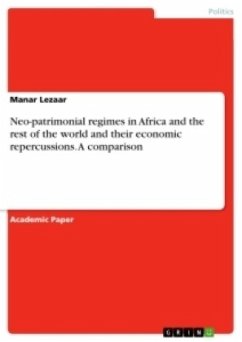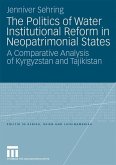Academic Paper from the year 2020 in the subject Politics - International Politics - Region: Africa, grade: 10th, Princeton University (Princeton University), course: Political Eeconomics, language: English, abstract: In this article, the author argues that Neopatrimonialism in Africa and Neopatrimonialism outside Africa are two different things in so many aspects, making the case of neopatrimonialism in Africa a distinguishable and different one than the rest of the world, that should be taken into consideration for further studies discreetly.The author also argues that while neopatrimonialism might leverage some nations and support democracy, the same case doesn't apply to the Sub Saharan regions.Going by the many articles defining the definition of neopatrimonialism, many researchers intertwine neopatrimonial regimes with developing countries and correlate the term with the levels of corruption and poverty in those countries.Several studies have been applied to neopatrimonialism to explain the depravity in several developing countries from different continents, without distinguishing between neopatrimonialism in Africa and neopatrimonialism in the other parts of the world.Neopatrimonial regimes in Africa are way different from their counterparts in the rest of the world; several reasons contributed to the rise, the continuity and the failure of transition to democratic regimes in Africa, among those reasons: traditions, ethical representations, and personality rule those three conditions are present and repetitive in every case of the Sub Saharan countries under neopatrimonial regimes, however, that's not the case fo the rest of the neopatrimonial states outside Africa. Research around the term neopatrimonialism and its features seem to be one of the most intricate things about this term. Some scholars have stated that neopatrimonialism spurs democracy, they have argued that patrimonialism may promote both democracy and developmental governance. While both of the arguments stated might be true, there are not found in every society, neopatrimonialism might or might not bolster democracy depending on the type of the community, the personal rule is pivotal in neopatrimonial states; however, it's not found in every neopatrimonial regime.
Hinweis: Dieser Artikel kann nur an eine deutsche Lieferadresse ausgeliefert werden.
Hinweis: Dieser Artikel kann nur an eine deutsche Lieferadresse ausgeliefert werden.








